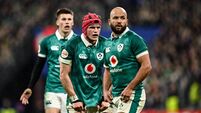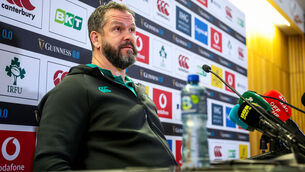World ranking now a key concern
A season that started so badly, with the collapse of any meaningful challenge at the World Cup, trundled to its inevitable conclusion with Ireland’s first defeat to England in five seasons.
Eddie O’Sullivan’s seven-year reign at the helm of the national side has now run its course. With just five wins from the 13 internationals since last year’s Six Nations championship, time has run out for a coach who has contributed so much to the Irish cause. The fact that those victories were against Italy (twice by a single score), minnows Namibia and Georgia at the World Cup and Scotland in the current campaign, means O’Sullivan is without a credible scalp for some time.















